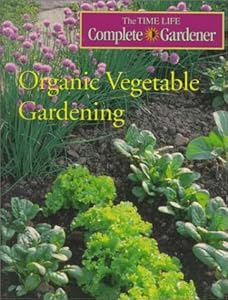 Cover via AmazonWith organic farming, farmers don't plant crops using genetic engineering, irradiation and sewage sludge. Instead, they rely on things like crop rotation, organic fertilizers, and the use of mulch and compost.
Cover via AmazonWith organic farming, farmers don't plant crops using genetic engineering, irradiation and sewage sludge. Instead, they rely on things like crop rotation, organic fertilizers, and the use of mulch and compost. Crop rotation is the practice of planting a different crop in the same area another crop once occupied. This keeps the soil’s nutrients fertile so it can be used again in the following season, and helps reduce pests and diseases which tend to inflict one specific crop.
But one of the main reasons why organic vegetable gardening is so important is the fact that the crops harvested typically have 50% more nutrients and vitamins compared to that of conventional farming methods. This helps improve health immensely, and prevent a number of health problems.
You can buy organically grown vegetables from the supermarket. The sad part is the almost everywhere you go, although the packaging comes from Department of Health, Quality Assurance International, California Certified Organic Farmers or the Oregon Tilth Farm Verified Organic, many of these are only 50% to 70% organic.
This is why homeowners who want to eat 100% organic vegetables are encouraged to grow them themselves - this way you know exactly what you are getting, without having to rely on a label to tell you the truth.
You can plant your garden from seed, buy little starts (seedlings), or buy larger plants and stick them right in the ground (however, if buying plants or seedlings, these may or may not have been treated with pesticides or other chemicals already, so be wary of this). Regardless of the start method you choose, you will need to prepare the soil, use compost and mulch, and make sure that the plants are safe from threats such as insects, weeds and other animals that will eat what you have planted.
 Image via WikipediaYou can fight these threats with other animals, insects, organic fertilizers, deodorant soap, or other natural methods. (For more info on these, keep an eye on this blog, and also visit http://www.newholisticliving.com/sustainablegardening.html for some great resources.)
Image via WikipediaYou can fight these threats with other animals, insects, organic fertilizers, deodorant soap, or other natural methods. (For more info on these, keep an eye on this blog, and also visit http://www.newholisticliving.com/sustainablegardening.html for some great resources.)For those who don’t have a big garden, they can try growing organic vegetables in containers. These will require more water than those planted in the soil so be sure to water frequently.
There is no doubt that organic vegetables and other organic products are important to our health these days. If you value your health you will want to investigate organically grown food as well as other organic items, and growing your own garden is a great way to take control of your health and what you eat.
And for those who decide to buy organically grown vegetables, remember to wash before cooking them - even if they are organic, you still need to make sure they are clean - not to mention reducing chemical residues which may have been transferred from non-organic vegetables during storage and transport.
Organic Gardening Resources:

No comments:
Post a Comment